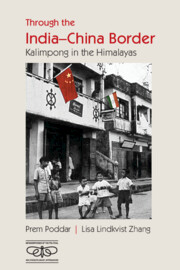Book contents
- Frontmatter
- Dedication
- Contents
- List of Figures
- Preface
- Acknowledgements
- List of Abbreviations
- Note on Translation and Transliteration
- Maps
- 1 Kalimpong as Interface: (Post)Colonial and Transcultural
- 2 Kalimpong as Metonym: India–China Correlation
- 3 Chinese (and Tibetan) Certification in Himalayan India: Foreigner Registration Files from the 1940s to the 1960s
- 4 Espionage, Intrigues and Politics: Kalimpong Chung Hwa School as Playhouse
- 5 Shangri-La (Gyalthang) to Kalimpong: The Road of Trade, Transculture and Conflict
- 6 Not the Last Word: An Inconclusion
- Glossary
- Bibliography
- Index
3 - Chinese (and Tibetan) Certification in Himalayan India: Foreigner Registration Files from the 1940s to the 1960s
Published online by Cambridge University Press: 28 November 2024
- Frontmatter
- Dedication
- Contents
- List of Figures
- Preface
- Acknowledgements
- List of Abbreviations
- Note on Translation and Transliteration
- Maps
- 1 Kalimpong as Interface: (Post)Colonial and Transcultural
- 2 Kalimpong as Metonym: India–China Correlation
- 3 Chinese (and Tibetan) Certification in Himalayan India: Foreigner Registration Files from the 1940s to the 1960s
- 4 Espionage, Intrigues and Politics: Kalimpong Chung Hwa School as Playhouse
- 5 Shangri-La (Gyalthang) to Kalimpong: The Road of Trade, Transculture and Conflict
- 6 Not the Last Word: An Inconclusion
- Glossary
- Bibliography
- Index
Summary
[F]ingerprint identification would supply an invaluable adjunct to a severe passport system. It would be of continual good service in our tropical settlement, where the individual members of the swarms of dark and yellow-skinned races are mostly unable to sign their names and are otherwise hardly distinguishable by Europeans, and, whether they can write or not, are grossly addicted to personation and other varieties of fraudulent practice.
—Francis Galton, ‘Personal Identification: Fingerprints’[Law] operates in a mode of difference that separates it from the varying formats of files. Files are constitutive of the law precisely in terms of what they are not; this is how they found institutions like property and authorship. They lay the groundwork for the validity of the law, they work towards the law, they establish an order that they themselves do not keep. Files are, or more precisely, make what, historically speaking, stands before the law.
—Cornelia Vismann, Files: Law and Media TechnologyEmpire and Border-Crossings
In the dying years of British India and the first flush of postcolonial Indian statehood, a clear continuity of laws and policy can be read, especially in relation to the registration of aliens. The small-scale strife of the Great Game at these Himalayan borders in the town of Kalimpong was coming to a close even as the registration of Chinese nationals continued under a cloud of suspicion over a period of twenty years at the Foreigners Registration Office. The spectre of spies, the reflux of the Great Game, the Tibet Question and eventually the 1962 Sino-Indian War haunt the distinction between ‘Japanese’, ‘Tibetan’ and ‘Chinese’ nationals and largely remain fuzzy. It is the anxious state's process of separating the ‘Chinese’ from their ‘Japanese’ and then ‘Tibetan’ (also subdivided as Amdowas, Khampas, half-castes, and so on) counterparts that led the charge to register ‘Chinese nationals’ under the British Indian registration of foreigners acts. Marking differences was a way of categorising and classifying in these registration processes such that boundaries could be constructed for the body political and the body social. The nervous nation's and the disciplinary state's rationale for capturing and interning dangerous ‘Chinese’ later is a part of this narrative.
- Type
- Chapter
- Information
- Through the India-China BorderKalimpong in the Himalayas, pp. 85 - 118Publisher: Cambridge University PressPrint publication year: 2025

